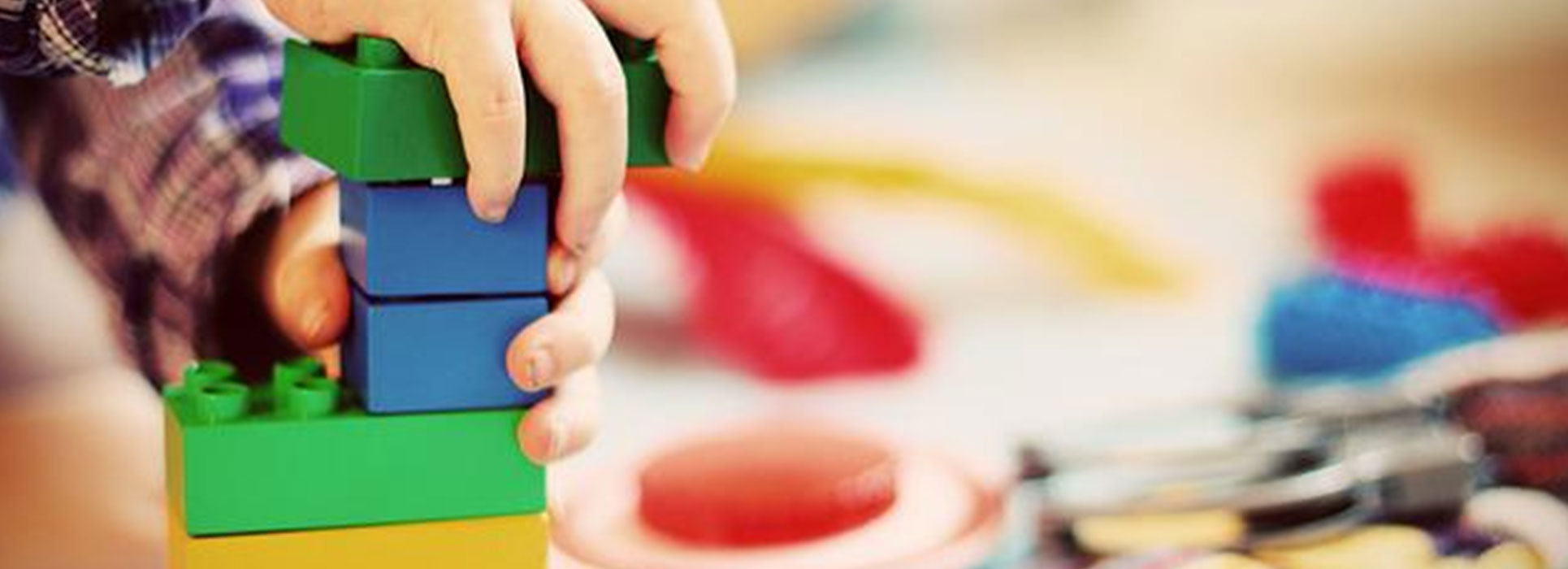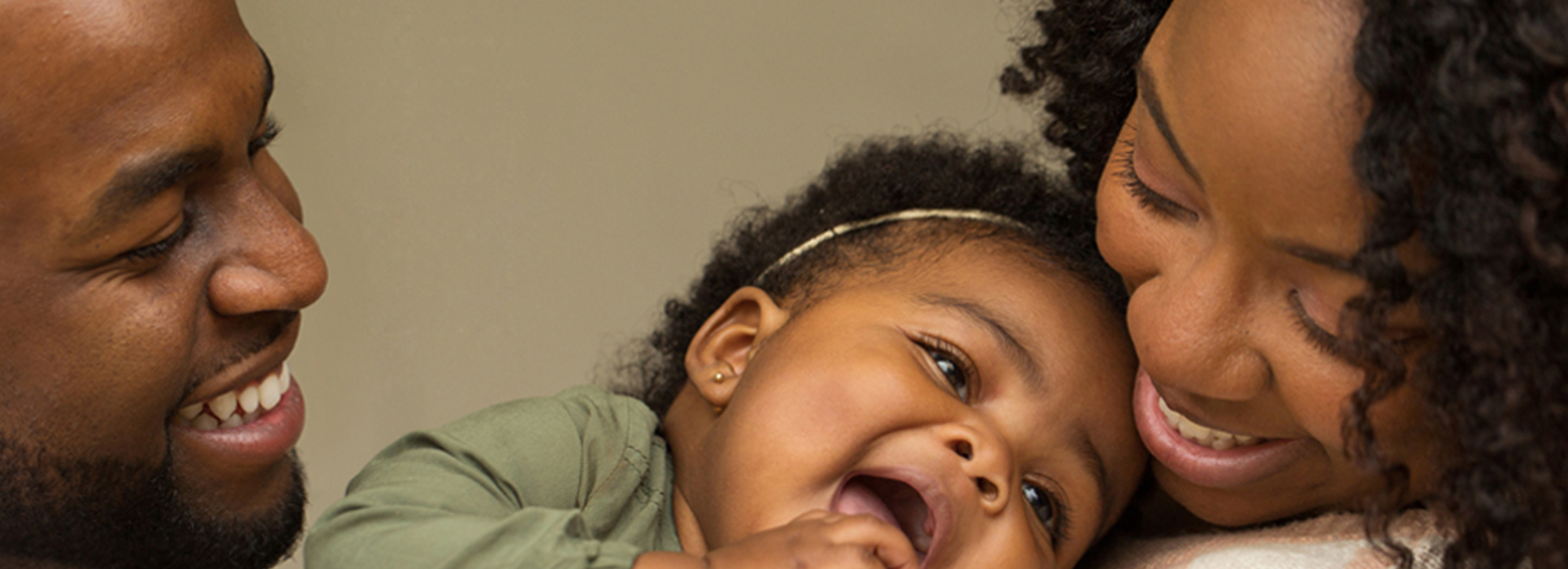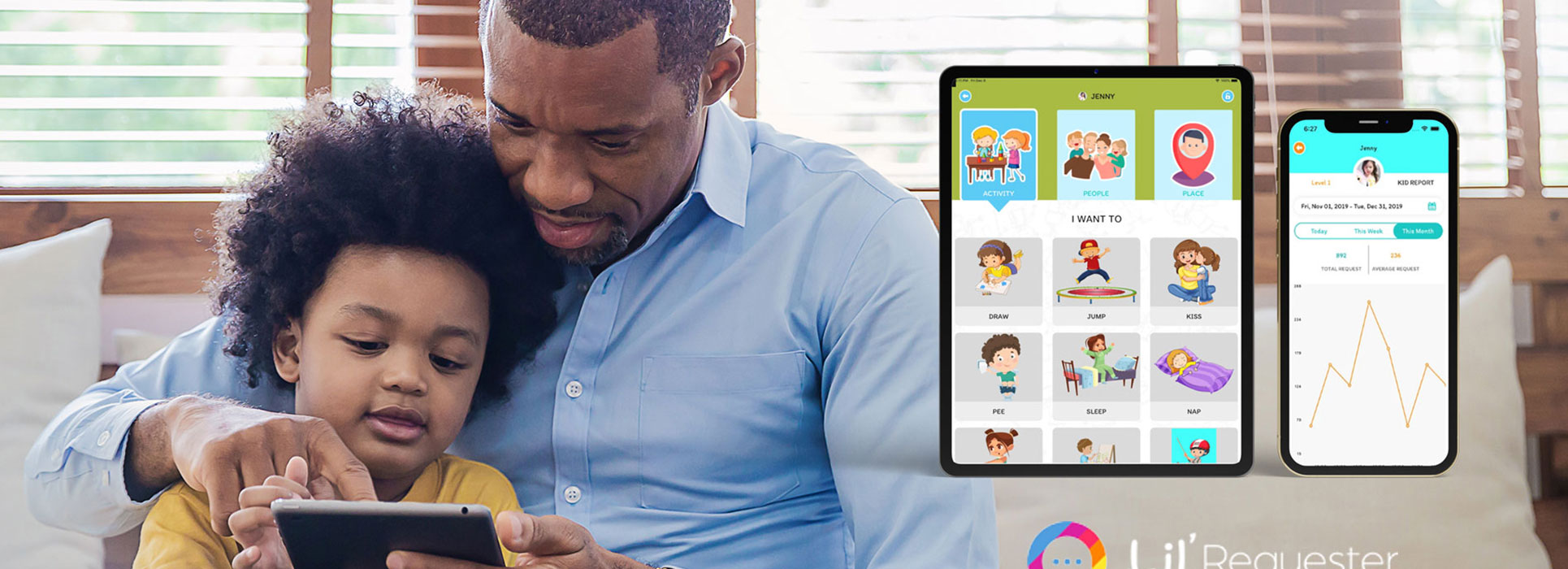1 in 44.
It’s the number of children who have been diagnosed with Autism Spectrum Disorder, according to the most recent statistics by the CDC
Needless to say, if your child has just received a diagnosis of Autism, you are certainly not alone. The prevalence of Autism has increased dramatically in the past 10 years.
You may have started your research before your child received a diagnosis of Autism. Or, maybe you were not anticipating your child is on the Autism spectrum. Either way, you’re likely to be asking yourself…”Now what?”
First, take a deep breath.
Next, know that you have the power to play an important role in your child’s progress and development. Studies have shown that the behaviors of a parent of a child with Autism can enhance development in Autism Spectrum Disorder.
As a parent of a child diagnosed with autism, you can actively implement and facilitate interventions that can help your child.
So, where do you start? And how can you ensure you are taking care of your own wellbeing as you embark on this lifelong journey?
Learn About an Autism Diagnosis
One of the first steps after your child receives a diagnosis of Autism is to do your research about what Autism is.
The CDC defines Autism Spectrum Disorder as “a developmental disability that can cause significant social, communication and behavioral challenges.”

There is a lot to learn about Autism. To start, here are a few basics:
- ASD begins before the age of 3 years.
- Symptoms can last throughout a lifetime, though they can improve with time and intervention.
- A “hallmark” characteristic of Autism is difficulties with communicating and interacting socially with others.
- Individuals with ASD often have “restricted repetitive behaviors or interests”. (This could include lining up toys, or conversation about a particular topic repetitively).
- Abilities of a child with Autism can range considerably.
- Some children with Autism will require more intervention and support long term than others with the diagnosis.
- Early diagnosis and early intervention are considered key in reducing symptoms and improving outcomes.
- A child can be diagnosed as early as 18 months, though many receive an ASD diagnosis later.
Look for Information from Reputable Sources
If your child is newly diagnosed, you’re likely embarking on a road of research and Googling, looking for more information and answers to the millions of questions you may have. It’s important that you and other family members look for information from the right sources.
To understand more about what an Autism diagnosis entails, you can start by contacting health professionals who are knowledgeable about the diagnosis.
This includes specialists including:
- Pediatrician
- Neurologist
- Developmental Pediatrician
- Psychologist
One of these professionals may have assessed your child and given him or her a diagnosis of Autism. Be sure to schedule follow up visits with the doctor to discuss more about what Autism is and the symptoms and severity that presents in your child.
Top online reputable resources for parents and family members wanting to learn more about the diagnosis include:
The Centers for Disease Control and Prevention (CDC)
Autism Speaks Resource Guide
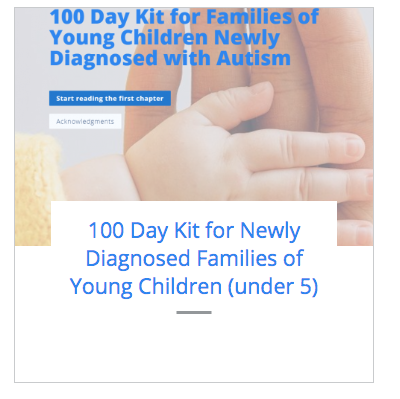
National Institutes of Health
National Institute of Child Health and Human Development
American Speech Language Hearing Association (ASHA)
Seek Support
It’s been said that parents are a child’s first and most important teacher.
As with any child, parents of a child diagnosed with ASD will play a significant role in supporting his or her functioning and skills throughout the lifetime.
In order to support your child, it’s important to make sure you yourself are supported and ready to take on challenges to advocate for your child.
Deficits shown in children with ASD, including impairments in the child’s social engagement with others and communication skills, can lead to stress, anger, and depression in parents. Therefore, when first starting this journey of having a child diagnosed with Autism, it’s important that families seek support groups that can help work through these emotions.
- AutismSpeaks.org A resource guide for local Autism support groups by state.
- Family Network of Disabilities Get live support and find out about local events and groups near you.
- Center for Autism and Related Disabilities (CARD) Based in Florida, this organization has support groups all over the country
- Autism Spectrum Coalition Find local help and support in your area.
- Facebook group. Join an online community of other parents who have a child with Autism to find support.
Things to Remember
Juggling appointments, keeping up with medical jargon, and everyday parenting can be overwhelming.
One parent of a child with Autism, in an article by AutismSpeaks.org, recommends telling yourself a few reminders:
“Don’t let the Autism diagnosis intimidate you.”
“There is a lot of camaraderie in the Autism community. Reach out.”
“Things are going to be okay.”
Contact your Local Early Intervention Agency
As a parent of a child newly diagnosed with Autism, if your child isn’t already enrolled in your local state early intervention program, you’ll want to get in touch with the program.
Early intervention (ideally before age 3) is key when addressing and improving impairments in children with Autism.
According to research, a child who receives intervention earlier has a better chance for learning and making progress. That’s partly due to the plasticity of the brain. At ages 2 and 3, the brain is still forming, so treatment can be more effective.
Through the Autism Speaks website, parents can look up Early Intervention offices by State.
The Centers for Disease Control and Prevention (CDC) also has a list of Early Intervention programs for each state.
One of the best first steps you can take if you have a child who just received an Autism diagnosis is getting in touch with the Early Intervention program in your state. These programs are for children from birth to 3 years-old.
Because the program is run by the government, services are free.
You will want to schedule an evaluation first. This evaluation will likely cover several areas of your child’s development. That includes social/emotional, communication, fine motor, sensory, and gross motor/physical development.
Depending on the results of the evaluation and what areas your child is delayed in, the program may then recommend certain weekly services and therapies for your child.
One of those services, provided by the agency, may be Early Intervention services provided by an Infant Toddler Development Specialist or and Early Intervention Specialist.
The Infant Toddler Development Specialist (ITDS) may work with your child weekly in your home, or can typically travel to your child’s daycare.
The specialist will help promote development and learning during the infant and toddler years. The ITDS also works with the child’s family members to understand the child’s specific needs and how to promote their development at home.
Start Speech Therapy
Sometimes children with Autism are already receiving Speech Therapy. Your child’s Speech Therapist may have even been one of the professionals who referred your child to be evaluated by a Developmental Pediatrician, Neurologist, or Psychologist.
If your child isn’t currently receiving weekly Speech Therapy services, it’s a good idea to schedule an evaluation with a Speech-Language Pathologist as soon as you can.
One of the defining characteristics of Autism is an impairment in social-communication skills. In fact, more than half of young Autistic children have language delays according to research by the International Society for Autism Research 2019.
Following an evaluation with a Speech-Language Pathologist, the therapist may make a recommendation for your child to attend therapy weekly (sometimes multiple times during the week).
You can schedule an evaluation through an outpatient clinic at a local children’s hospital or private practice. It could be helpful to mention that your child has an Autism diagnosis when scheduling, and request an appointment earlier rather than later. Some settings may have a wait list for therapy appointments.
How Can Speech Therapy Help my Child?
Speech Therapy can help children with Autism improve their nonverbal and verbal communication skills
Some children with Autism may not use words to communicate their wants, needs, and feelings to others around them during their daily life. This can be frustrating for both the child and the family. It can also result in difficult behaviors at times.
Those children may benefit from using Augmentative Alternative Communication (AAC) to communicate.
AAC can include using gestures, sign language, pictures, apps on a tablet, or an electronic speech generating device.
There are many benefits to using AAC for some kids with Autism. Those benefits may include:
- Improved receptive language skills
- Improved expressive language skills
- Stronger social skills
- Improved behaviors
If your child’s Speech-Language Pathologists (SLP) thinks your child could benefit from AAC, the SLP will make a recommendation for a program.
Lil Requester is an AAC app that can be downloaded onto a tablet or phone. The app can empower kids with Autism with a means of communication by using audio and visual cues.
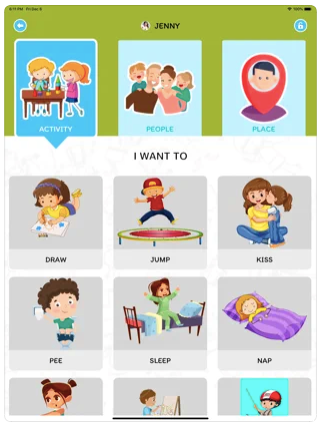
Weekly Speech Therapy can also help encourage a child with Autism to talk. The SLP will engage your child in educational, play-based activities to help him or her learn to use sounds and words to communicate with others in their environment.
Some children with Autism may not be able to understand or process language the way others do when they listen to speech. Treatment through Speech Therapy can address these difficulties.
It’s common for kids on the Autism Spectrum to have difficulty making friends and engaging in social situations in a home, school or social environment. Speech therapy can help children develop these social skills so they learn to make friends and talk appropriately in different environments. Some adult with Autism may benefit from continuing to improve their social skills.
See an Occupational Therapist
Occupational Therapy (OT) is a service that can help a person with Autism develop their ability to participate in important activities of daily living (ADLs). Children with Autism may sense the world around them differently.
Autistic children could have sensory aversions (an aversion to certain sounds or feeling certain textures), or might crave sensory input as shown by constant activity.
Start by contacting a local Occupational Therapist for an evaluation. That will likely including looking at several areas related to your child’s development, including:
- Fine motor skills
- Sensory integration
- Self-regulation
- Self-care routines and Life skills
- Emotional development
- Behavior
Consider Behavioral Therapy
Some Autistic characteristics can result in behavioral challenges for children. If your child is showing aggressive behaviors, excessive tantrums, or defiance, this could be a sign that you should consider Behavioral Therapy.
ABA, Applied Behavior Analysis, can help adults who care for a child with Autism to understand some of the child’s behaviors. By understanding why the behaviors occur, and assessing the child’s environment, the ABA therapist can help.
ABA therapy will likely involve the therapist providing the child or adults with helpful strategies to improve desired/positive behaviors and reduce negative behaviors shown by the child.
Many times, kids with Autism show negative behaviors because of their difficulty communicating with others. If you have a child newly diagnosed with Autism, you may want to consider downloading a communication App onto a tablet. By selecting an icon that shows a picture and says a word (such as desired activity or food), your child can successfully communicate in an appropriate way.
Additional Resources to Get Started
Parenting is a journey.
Parenting a child with Autism may be an especially complicated journey, possibly filled with stress and challenges along the way.
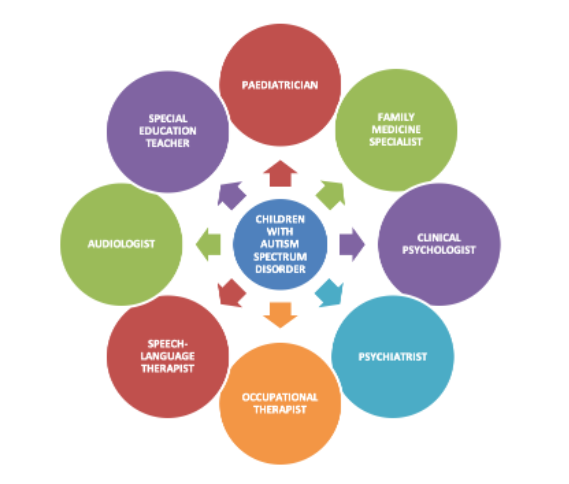
Try and find relief by forming an action plan in getting your child started in all of the necessary services that are typically recommended for children with Autism.
One thing that could immediately help your child? Downloading the Lil Requester app can give a child with Autism an effective way to communicate with the world around them. You can customize an electronic communication board for your child to use across environments.
And don’t forget to breathe. You’ve got this.
Amy Yocoub is a Clinical Competence Certified Speech Language Pathologist and an SLP Consultant at Lil Requester.


